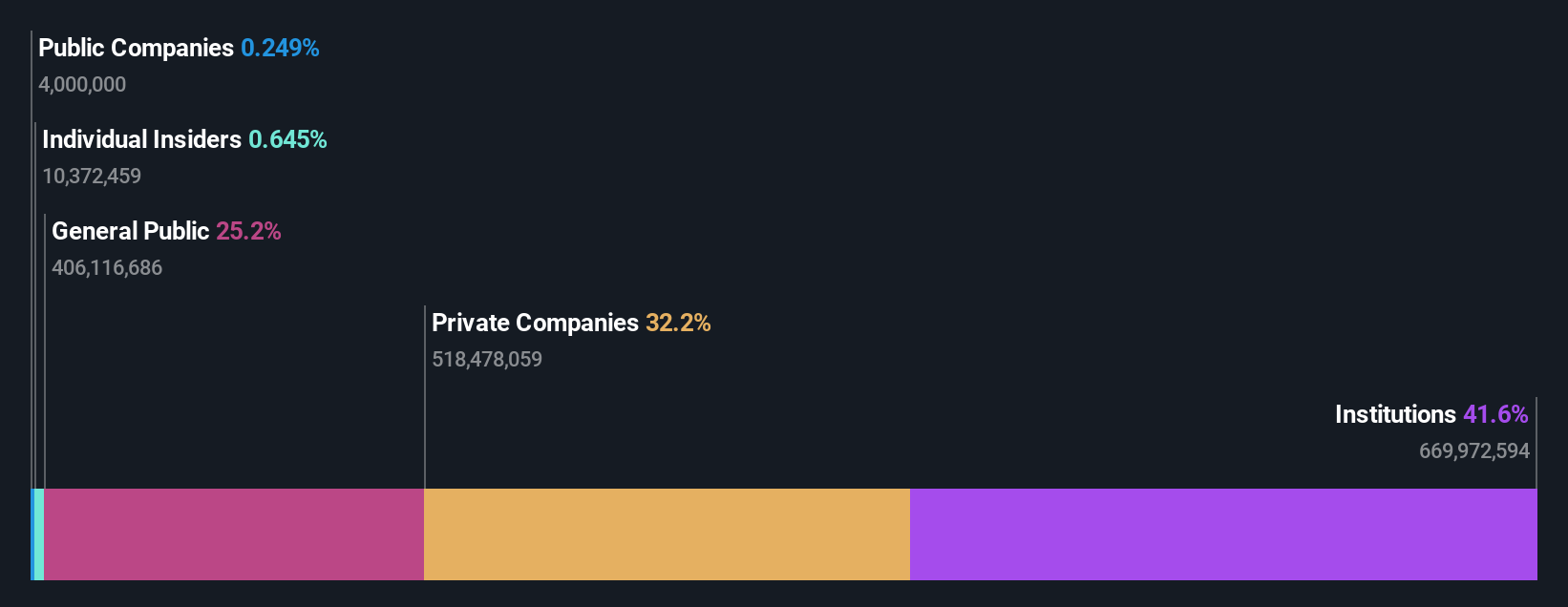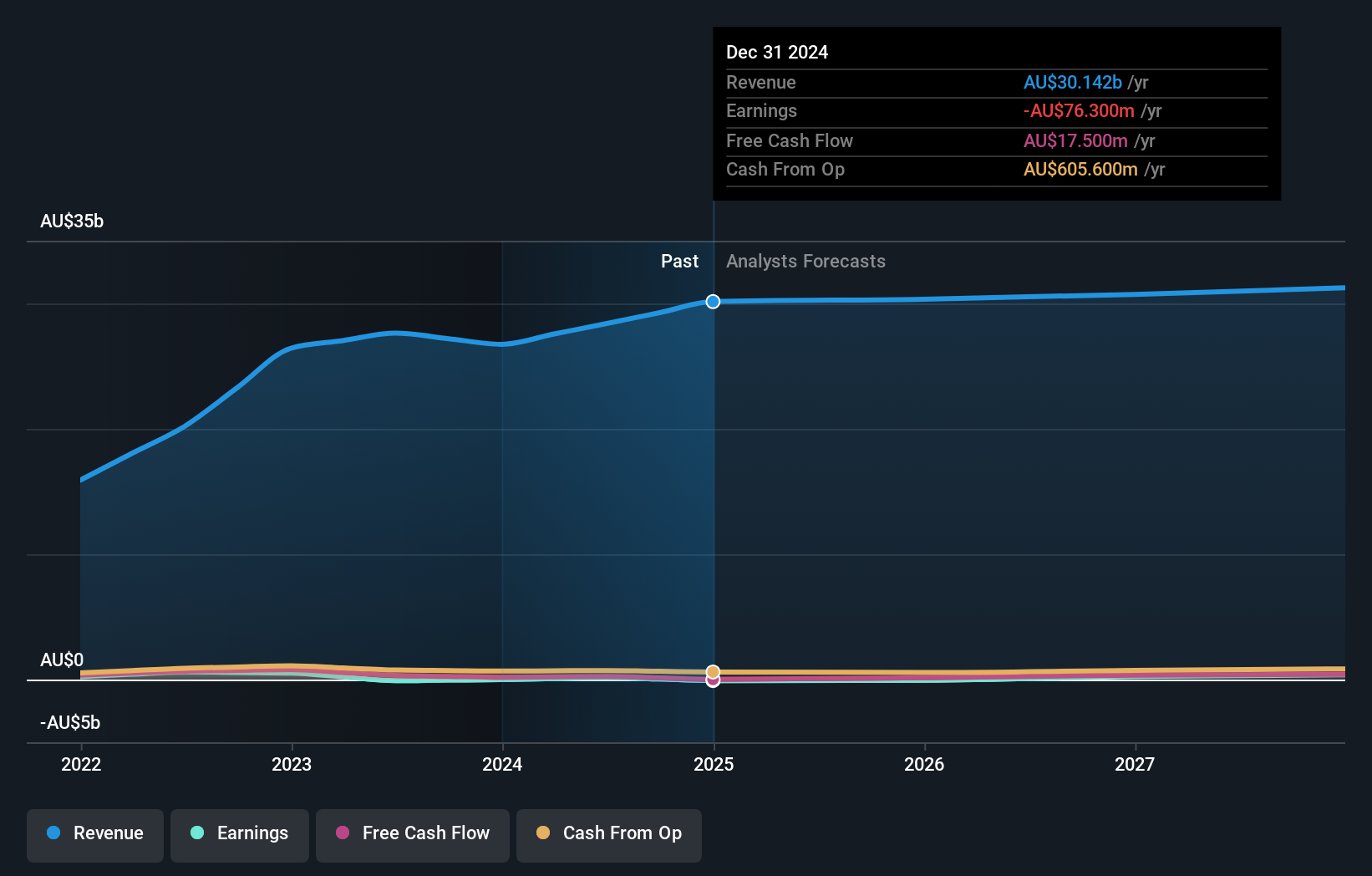Institutional investors may adopt severe steps after Viva Energy Group Limited's (ASX:VEA) latest 3.5% drop adds to a year losses
Key Insights
- Given the large stake in the stock by institutions, Viva Energy Group's stock price might be vulnerable to their trading decisions
- 54% of the business is held by the top 5 shareholders
- Using data from analyst forecasts alongside ownership research, one can better assess the future performance of a company
Trump has pledged to "unleash" American oil and gas and these 15 US stocks have developments that are poised to benefit.
Every investor in Viva Energy Group Limited (ASX:VEA) should be aware of the most powerful shareholder groups. The group holding the most number of shares in the company, around 42% to be precise, is institutions. In other words, the group stands to gain the most (or lose the most) from their investment into the company.
As a result, institutional investors endured the highest losses last week after market cap fell by AU$129m. The recent loss, which adds to a one-year loss of 29% for stockholders, may not sit well with this group of investors. Often called “market movers", institutions wield significant power in influencing the price dynamics of any stock. Hence, if weakness in Viva Energy Group's share price continues, institutional investors may feel compelled to sell the stock, which might not be ideal for individual investors.
Let's take a closer look to see what the different types of shareholders can tell us about Viva Energy Group.
Check out our latest analysis for Viva Energy Group

What Does The Institutional Ownership Tell Us About Viva Energy Group?
Many institutions measure their performance against an index that approximates the local market. So they usually pay more attention to companies that are included in major indices.
We can see that Viva Energy Group does have institutional investors; and they hold a good portion of the company's stock. This implies the analysts working for those institutions have looked at the stock and they like it. But just like anyone else, they could be wrong. It is not uncommon to see a big share price drop if two large institutional investors try to sell out of a stock at the same time. So it is worth checking the past earnings trajectory of Viva Energy Group, (below). Of course, keep in mind that there are other factors to consider, too.

Viva Energy Group is not owned by hedge funds. Looking at our data, we can see that the largest shareholder is Viva Energy B.V. with 29% of shares outstanding. In comparison, the second and third largest shareholders hold about 6.9% and 6.8% of the stock. Furthermore, CEO Scott Wyatt is the owner of 0.6% of the company's shares.
To make our study more interesting, we found that the top 5 shareholders control more than half of the company which implies that this group has considerable sway over the company's decision-making.
While studying institutional ownership for a company can add value to your research, it is also a good practice to research analyst recommendations to get a deeper understand of a stock's expected performance. Quite a few analysts cover the stock, so you could look into forecast growth quite easily.
Insider Ownership Of Viva Energy Group
The definition of company insiders can be subjective and does vary between jurisdictions. Our data reflects individual insiders, capturing board members at the very least. Management ultimately answers to the board. However, it is not uncommon for managers to be executive board members, especially if they are a founder or the CEO.
Insider ownership is positive when it signals leadership are thinking like the true owners of the company. However, high insider ownership can also give immense power to a small group within the company. This can be negative in some circumstances.
Our information suggests that Viva Energy Group Limited insiders own under 1% of the company. We do note, however, it is possible insiders have an indirect interest through a private company or other corporate structure. Keep in mind that it's a big company, and the insiders own AU$23m worth of shares. The absolute value might be more important than the proportional share. It is always good to see at least some insider ownership, but it might be worth checking if those insiders have been selling.
General Public Ownership
With a 25% ownership, the general public, mostly comprising of individual investors, have some degree of sway over Viva Energy Group. This size of ownership, while considerable, may not be enough to change company policy if the decision is not in sync with other large shareholders.
Private Company Ownership
Our data indicates that Private Companies hold 32%, of the company's shares. It's hard to draw any conclusions from this fact alone, so its worth looking into who owns those private companies. Sometimes insiders or other related parties have an interest in shares in a public company through a separate private company.
Next Steps:
It's always worth thinking about the different groups who own shares in a company. But to understand Viva Energy Group better, we need to consider many other factors. Be aware that Viva Energy Group is showing 2 warning signs in our investment analysis , you should know about...
But ultimately it is the future, not the past, that will determine how well the owners of this business will do. Therefore we think it advisable to take a look at this free report showing whether analysts are predicting a brighter future.
NB: Figures in this article are calculated using data from the last twelve months, which refer to the 12-month period ending on the last date of the month the financial statement is dated. This may not be consistent with full year annual report figures.
New: Manage All Your Stock Portfolios in One Place
We've created the ultimate portfolio companion for stock investors, and it's free.
• Connect an unlimited number of Portfolios and see your total in one currency• Be alerted to new Warning Signs or Risks via email or mobile• Track the Fair Value of your stocks
Try a Demo Portfolio for FreeHave feedback on this article? Concerned about the content? Get in touch with us directly. Alternatively, email editorial-team (at) simplywallst.com.This article by Simply Wall St is general in nature. We provide commentary based on historical data and analyst forecasts only using an unbiased methodology and our articles are not intended to be financial advice. It does not constitute a recommendation to buy or sell any stock, and does not take account of your objectives, or your financial situation. We aim to bring you long-term focused analysis driven by fundamental data. Note that our analysis may not factor in the latest price-sensitive company announcements or qualitative material. Simply Wall St has no position in any stocks mentioned.
Disclaimer: Investing carries risk. This is not financial advice. The above content should not be regarded as an offer, recommendation, or solicitation on acquiring or disposing of any financial products, any associated discussions, comments, or posts by author or other users should not be considered as such either. It is solely for general information purpose only, which does not consider your own investment objectives, financial situations or needs. TTM assumes no responsibility or warranty for the accuracy and completeness of the information, investors should do their own research and may seek professional advice before investing.
Most Discussed
- 1
- 2
- 3
- 4
- 5
- 6
- 7
- 8
- 9
- 10